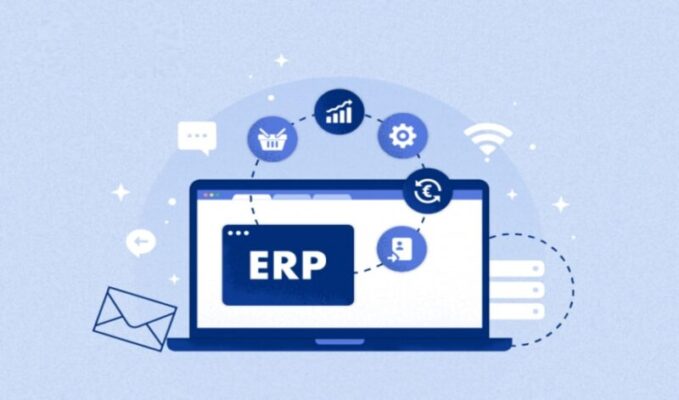
Top ERP (Enterprise Resource Planning) Systems 2020
Last updated on June 23rd, 2022 at 04:29 am
Some businesses make their success look easy. They have an impressive market share, an amazing corporate culture, happy customers, and monumental social impact. But, behind all that success exists a well-oiled, managed machine. Businesses often test their processes to develop more effective strategies for their reaching their goals. That’s where the top ERP software comes into play.
Enterprise resource planning (ERP) software offers a suite of applications that manage a variety of business functions, such as accounting, human resources, inventory, manufacturing, and sales.
Enterprise software systems can be customized depending on the industry, company size, and necessary functions. It’s possible to pick and choose which applications are best for your business. It is important to optimizing your processes without an extra budget.
Types of ERP by Industry
Most enterprise software vendors try to cater to specific industries, knowing that integrated systems still need to optimize without adding new tasks to the process. Instead, your processes should be streamlined and optimized depending on what you need. Most enterprise software is available as a whole enterprise software rise package. It can be customized with modules that you can pick and choose.
The differences in enterprise software depend on the particular needs of the industry. For example, manufacturing industries in plastics and petrochemical will be different than those in automotive manufacturing.
You can compare the needs of enterprise software in relation to different industries below:
Aerospace and Defense
Since this field is regulated, enterprise software is essential to support operations and provide thorough documentation. In this environment, enterprise software modules will likely manage the production scope, by building a table of properties for each crafted piece. Engineers will need to sign off on these before they can move on to the next part of production or to meet ITAR compliance.
Besides, distribution schedules, transportation management, and chain management modules will be important to maintaining efficiency and safety.
Automotive manufacturing
The product line of any automotive manufacturer is quite long and complicated. There are some vehicular systems with individual parts and management requirements. Also, this industry requires more analysis and documentation of different automotive and inventory changes.
With an entire catalog of products, parts, and services, automotive manufacturers can use enterprise software to manage different processes and functions, making sure that every unit is accounted for so that owners get a comprehensive view of the business’ health.
Plastics and Petrochemical
Chemical materials and production lines are quite different than in other industries. These need more waste reduction, supply chain management, and efficiency. Enterprise software would likely help these companies innovate their supply chain and reduce waste, making sure that more of the raw materials become finished products rather than scrap.
Electronics and Technology
In electronics systems, enterprise software manages the processes necessary to print circuitry, build LCD technology, and craft a long list of hardware devices for integrated technology systems.
Enterprise software can help with supply scheduling, inventory management, revenue documentation, and production timelines for time-to-market projection. Enterprise software can also assess engineering approaches connected to different products and see which ones will result in the best possible outcomes. In other cases, it may suggest a change to avoid waste and promote revenue.
Healthcare
While it may seem like an uncommon industry associated with enterprise software, there are systems made to handle the daily processes of the healthcare industry and improve efficiency. For example, a healthcare enterprise software system might track information for human resources and accounting, such as payroll and hospital inventory management.
Hospitality
Managing any kind of hotel or restaurant means managing a ton of moving parts. Enterprise software can help these businesses keep track of all the information tied to their operations in one place. These systems include inventory management for things like linens or silverware, but it can also track guest activity and integrate with point of sale systems, allowing you to track and report on all transactions.
Types of enterprise software by Implementation
Depending on the size and complexity of your business, you can also choose different ways to install an enterprise software system. For example, there are all-in-one systems that are more difficult to scale than cloud enterprise software.
When considering what implementation to select, think about the following factors first:
- Size and complexity of your business
- Level of risk you’re willing to take
- Software architecture and integration
- Type of enterprise software implementation
- Benefits to your organization
- Impact on your staff and operations
- Budget and time requirements
Here are four different types of enterprise software implementation:
- Big Bang
In this implementation strategy, all users are moved over to a new system by a specific date. This is considered a virgin enterprise software strategy as it helps a business switch over to a new process, and it’s less expensive. But, you won’t have as much time for end-to-end testing, and you may run into errors when trying to integrate other systems or scale your enterprise software to include new processes in the future.
- Parallel Adoption
In this method, the legacy system is still kept in operation in parallel with a new enterprise software implementation. The older system will be replaced altogether by the new enterprise software modules, but with this method, you can save on risk and move through mission-critical situations in your business. It’s also the most expensive type of implementation.
- Phased Rollout
When businesses don’t have the money for parallel adoption but want a scalable, integrated approach to implementation, a phased rollout is the best option for enterprise software. In this approach, businesses keep legacy systems and phase in the new processes from enterprise software systems. It’s often the best choice for larger manufacturing organizations because it’s flexible and less risky.
Businesses must set milestones and keep to their rollout schedule so that implementation doesn’t take years.
- Hybrid Rollout
Some modules may be implemented immediately using the big bang method, while others may take a phased approach. You can pick and choose what modules to install and when so that it best suits your business needs for now and in the future.
Benefits of enterprise software
There is a variety of enterprise software, it’s important to consider every factor. It helps streamline business operations, inventory management, accounting, CRM, and more.
Here are a few of the benefits we’ve seen with enterprise software systems for different industries:
- Order integration
- Financial information integration
- HR information standardization
- CRM tool integration
- Standardization of manufacturing processes
- Procurement standardization
- Accounting management
- Analytics and reporting
- Sales reporting and projections
- Inventory tracking
- Quality control
- Complete process automation
The best enterprise software systems can do a lot for your business. Each module can benefit certain products and services, but , this software is designed to improve your workflow, help better communication, and enhance the operations of your business.
Best ERP Systems in 2020
We’ve found that the best ERP systems have revolutionized their products and made it easier for businesses to upgrade with innovative implementation. The top ERP system will have a long list of modules and features that can benefit a variety of businesses in any industry.
1. Oracle NetSuite
Oracle creates the top cloud-based enterprise planning software. Not only can it integrate finance, purchasing, planning, invoicing, sales, marketing, inventory, human resources and so much more, it’s also multi-language and tax-compliant.
The software’s architecture uses a multi-tenant environment, allowing businesses to pick and choose modules they want to integrate. The system works for businesses in software and technology, discrete manufacturing, wholesale distribution, retail, advertising, and many other manufacturing industries.
Pricing
There are many tiers and levels available. NetSuite pricing starts at $999 per month.
Pros
- Suitable for hundreds of business types
- Multi-currency/multi-language
- Multi-subsidiary management
- enterprise software financials
- CRM integration
- Ecommerce integration
- Revenue recognition
- Fixed asset management
- Automation of business processes
- Tiered pricing
Cons
- Quite expensive
- Premium support costs extra
- Payroll system not fully integrated uses Ceridian Payroll and Tax engine
2. Microsoft Dynamics
There are actually six different products included in Microsoft Dynamics 365: AX, GP, NAV, SL, Microsoft Dynamics CRM, and Microsoft Dynamics RMS. All are designed to work together, though each has been acquired by buying out other companies.
This software is intended for small to medium enterprise software rise businesses, while Microsoft Dynamics AX has more potential for larger corporations. These systems are designed to be deployed as one package or deployed as businesses grow and scale-up.
The software has the same features as NetSuite, but it also allows for smart assist technology and custom scripting tools to enhance your operations even more. It also includes more software for retail management solutions and improved customer experiences.
Pricing
Not all pricing is available upfront for Microsoft Dynamics 365. Each package has a different price depending on the needs and integration method. For example, Dynamics 365 Business Central is $70 per user, per month, but Microsoft Dynamics 365 for Marketing is $750+ per month.
Pros
- syncs with other Windows software
- Information and data easily communicate between different systems
- Multi-lingual and multi-currency
- Less expensive than other enterprise software
- Many integrations for retail, sales, and finance processes
Cons
- Not as robust or integrated as SAP or NetSuite
- Diminished support for small businesses
3. SAP Business One
With excellent features, better flexibility, and extensive customization, SAP Business One is one of the best enterprise software systems for larger businesses. The underlying SAP HANA database delivers on all kinds of metrics and business analytics.
The system is a bit old school, but that’s what so many clients like about this software. It’s able to integrate with other systems, such as inventory management and point-of-sale processes. Others not familiar with enterprise software integrations may find the extensive customization to be problematic.
Pricing SAP offers its basic system at a starting cost of $82 per month.
Pros
- Excellent documentation
- Extensive customization for all business types
- Complex business analytics
- Integrates with Microsoft SQL Servers
- Crystal Reports included
- Multi-currency/multi-language
- Benefits administration integration
- Less expensive starting price
Cons
- Likely will need special installation and configuration through a partner like a Value Added Reseller (VAR)
- Requires lots of customization to work properly
- Some features are pared down, such as HR modules
What’s the Top ERP System For Your Business?
The best way to consider different systems is to work with an expert, certified enterprise software consultant. This ensures the successful implementation of an enterprise software system that will work with your business needs and goals. Not only can a consultant help you select the right modules or all-in-one cloud-based enterprise software, but you’ll also receive expert setup, configuration, and ongoing maintenance.
It’s time to streamline your business and make next quarter the best.

Dave Wood, Global Director of Supply Chain and Retail, Chetu Inc. Dave is an industry expert within the supply chain and logistics technology landscape. He works at Chetu Inc., Plantation, Fla., a custom software development provider and thought-leader within the IT community. He offers commentary on changing tides within logistics and how inventory and warehouse management systems can propel all facets of retail and supply.
